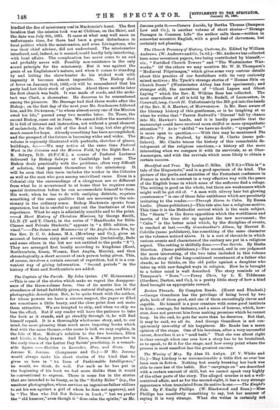The Captain of the Parish. By John Quine. (W. Heinemann.)
—This is one of the stories which make us regret the disappear- ance of the three-volume form. One of its merits lies in the abundance of detail faithfully given, natural dialogue, and bits of photographic description. But, to be quite frank with the author, for whose powers we have a sincere respect, the pages so filled are sometimes a little heavy, and the close print does not make them attractive. We are tempted to skip, and when we skip we lose the effect. But if any reader will have the patience to take the book as it stands, and go steadily through it, he will find himself repaid. It is a thoroughly wholesome story, and, to our mind, far more pleasing than much more imposing books which deal with the same themes,—the scene is laid, we may explain, in the Isle of Man. Molroy's relation to the two heroines, Ellen and Lizzie, is finely drawn. And Enos, a Mormon preacher in the early times of the Latter Day Saints' practising, is a remark- able figure. — Sketches in Lavender, Blue, and Green. By Jerome K. Jerome. (Longmans and Co.) — If Mr. Jerome would always make his short stories of the kind that he gives us here in " An Item of Fashionable Intelligence," he would, we think, do well. For such as he has put in the beginning of his book we feel more dislike than it would be conventional to express. There is some fun in the stories that are intended to be funny, as in the "Hobby Rider" (e.g., the amateur photographer, whose services an ingenious father utilises to set his son against a girl of whom he does not approve), and in "The Man who Did Not Believe in Luck ; " but we prefer the "old humour," even though it " does calm the spirits," as Mr. Jerome puts it.—Camera Lueida, by Bertha Thomas (Sampson Low and Co.), is another volume of short stories—" Strange Passages in Common Life" the author calls them—written in somewhat eccentric English, with a good deal of cleverness, but certainly not pleasing.


















































 Previous page
Previous page